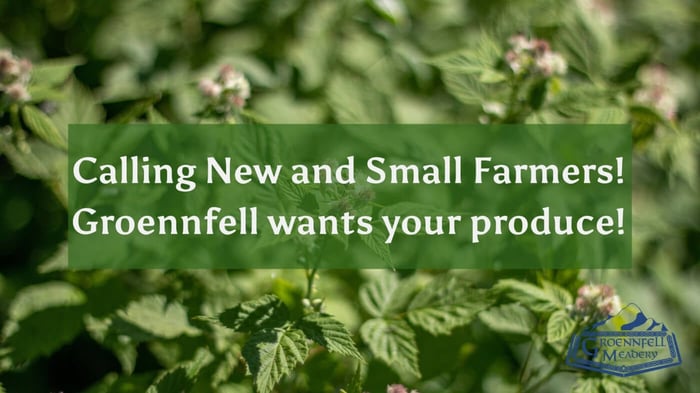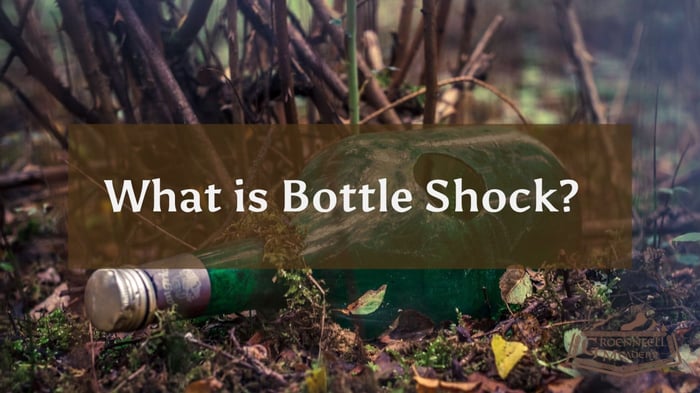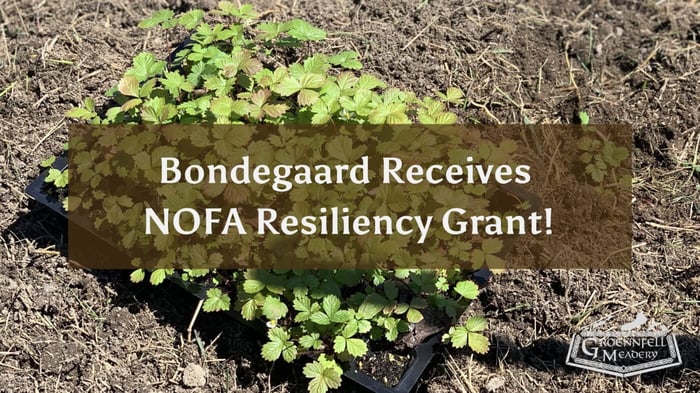Getting a small farm started is a lot of work. Trust us, we know, we've been there. And while small farms are no harder to start than large farms (actually easier in many ways), it can be harder to find markets for your produce given the quantities it's feasible to grow.
For us, our farm has been a hobby for many years. This was the first year we've actually been able to use some of our own ingredients in a batch of mead, and it was AWESOME! Seriously, it was just about the best feeling in the world to see something we grew from saved seeds go all the way to maturity, harvest, and then into a batch.
Now, we want to help other folks who want to try their hand at regenerative farming get a leg-up in their first few seasons.

These wild black raspberries were grown at Bondegaard and used by Mountain Mac CiderHow do we define a small (or new) farm?
We're pretty lax in our definition. You know a small farm when you see one, and "new" means different things to different people. This might be your twentieth year with a garden, but the first time you've ever tried to sell produce. You might be on your first piece of farmland and you're trying to decide what to put in the ground. Both of those sound new to us.
Maybe you have 120 acres, but you're only growing on half an acre while maintaining the rest as forest. That sounds like a small farm!
What really matters to us is the next part: Your land stewardship commitment.
What is regenerative ag and why do we care?
Regenerative ag, unlike "certified organic" or "biodynamic agriculture"[1] is a very loosely defined term and that's a good thing. For now, at least, no corporation has the right to say what is and is not "regenerative ag."
Regenerative ag also has numerous monikers such as "ecological farming," "biointensive agriculture," "sustainable farming," and many more which may all have a slightly nuanced definition in the mind of the farmer, but generally have the following principles in common:
- A focus on improving soil health.
- Increasing biodiversity both on the farm and in the larger environment.
- Drawing carbon from the atmosphere rather than releasing it from the soil. (aka "carbon sinking")
- Increased resilience in the face of a changing climate.
- Limiting (or eliminating) outside inputs, especially highly processed inputs such as inorganic fertilizers.
There are many, many more features that could be added, but these are fairly common and this is the list we generally use at Bondegaard. One nice thing about these principles is that they're just as easy to implement on small farms as large-scale industrial ag!
In fact, small farms may even have an advantage since they often don't need petroleum inputs that all farms with tractors require.

Even a 3-year-old can help out on a small farm.Why focus on small and new farms?
We're definitely not excluding large farms. In fact, at the time of writing this, that would be impossible. We use thousands of gallons of cranberry, cherry, and apple juice every year plus nearly one hundred tons of honey.
For our fruit, we're committed to using only domestic and local fruit, and that was a pretty big shift in and of itself.
It's specialty herbs and spices, things with high productivity, high resiliency, and a high profit margin that can form the backbone of a sustainable small farm operation. Fruit juices can be pressed and chilled, but fresh herbs are simply different from dried herbs. Not better or worse, just different.
We're making this special call for small and new farms because we know how big a deal it can be to get some little wins early on. We're also uniquely able to use small quantities of off-the-wall herbs and spices in our small batches.
 Mugwort growing at Bondegaard
Mugwort growing at Bondegaard
Do I have to be local (and what does local mean to you)?
Local is great for a variety of reasons (it usually reduces the carbon footprint, it build resilient communities, and much more), but it's not essential. Priority will be given to small/new farms with a strong regenerative ag component and products that fit well into our upcoming brew schedule.
What kind of produce are we looking for and how much?
Great question! We're not exactly certain ourselves! We never thought our hatch peppers would grow so well that they'd end up in Fire on Snow.
Here are the only rules:
- It must have a GRAS (generally recognized as safe) from the FDA. Good news, pretty much every ingredient you can think of has this. If you're curious, you can look it up.
- We can't process whole fruit, so it must be a juice, a concentrate, or dried.
- You must submit a summary of how the product was grown and handled.
The amount of the product we'd need varies dramatically depending on what we're brewing and what the ingredient is. In the case of the peppers we used, just a few pounds dried was sufficient. For the elderberries we're growing this year, we'll need several gallons of syrup which may or may not be feasible.
We won't be able to use every crazy ingredient folks bring to us, but don't hesitate to reach out!
Oh, and we have a small catering operation, so even if your product doesn't fit with our brewing needs, we may be able to cook with it.
How much do we pay?
Another great question! This is established with each individual farmer based on the crop in question.
I'm a new and/or small farmer, what are my next steps?
If you're looking to grow a specialty crop and you want to know if there's a market for it, please reach out to us directly at the start of your season and we can let you know and give you an estimate of how much we might be able to use.
If you have a bunch of things growing already and you want to know if we can use them in an upcoming batch, please use the same contact form to shoot us a message!
[1] To make it clear, we think it's a great thing that these terms are rigorously defined and updated periodically, it's just good that there are concepts that are used my dynamically in our culture.




